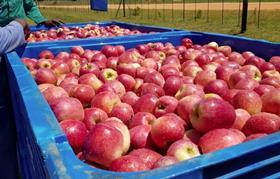
A few years ago, nobody in their right mind would have considered planting apples in South Africa’s northern Limpopo region.
That is, however, exactly what has happened since the release of a new range of apple varieties with low cooling requirements.
In the past, apple production has been restricted to the Western Cape and the Langkloof region of the Southern and Eastern Cape. There have also been a few orchards in the Eastern Free State.
South Africa’s Agriculture Research Council (ARC) has released these new varieties over the past few years. Bred by Dr Iwan Labuschagne, the varieties are now being commercialised by the plant development company Culdevco.
The important thing is that these varieties are early and are on the market in December, when South African consumers have in the past had to rely on apples from the Cape Province which have been in Controlled Atmosphere storage for almost the whole year.
“These {newer] varieties are not only early, but also ripen even earlier in areas with warm winters,” said Dr Leon van Mollendorff, general Manager of Culdevco.
So far more than 200 hectares of the varieties have been planted in Limpopo, where growers near Polokwane, Mondimole and Mookogopong have eagerly planted them. The orchards are established under nets because it is a summer rainfall region.
Growers elsewhere, in warmer areas, have also shown interest in planting these varieties and according to Dr Van Mollendorff there are now 300ha planted, enough to cause a stir in the pre-Christmas period when consumers would normally not axpect to see fresh apples on retail shelves.
“Even neighbouring countries are starting to plant them,” he explained. “If you think Namibia may not become an apple producer, think again.”
While Cape apple growers may not be too keen on the idea of fresh summer apples appearing in their marketing window in December, it will bring new options to growers further to the north.
The venture should also be taken seriously if one remembers that Cape table grape growers have often in the past ridiculed growers in the north for their efforts to enter mainstream table grape production – today, grape growers in this region pack around 7m cartons each season.
Traditionally, apple trees require at least 800 cold units during winter to grow optimally. The new range of apples, marketed as the Solar Range, needs a mere 250 – 600 cold units.
“This means these cultivars are suitable to grow in almost all regions where peaches and nectarines adapted well, including but not limited to the Limpopo Province,” outlined Dr Van Mollendorff. “The result is a sweet, perfectly balanced, crisp red blush apple that is harvested up to two months earlier than Gala type of cultivars.”
Afri Star, Afri Blush and Afri Glo are the most popular of the range of six apples released so far. It is reported that Dr Labuschagne, now retired from the ARC, bred the varieties during the 1990s. More than 20 years later they are finally making an impact.



